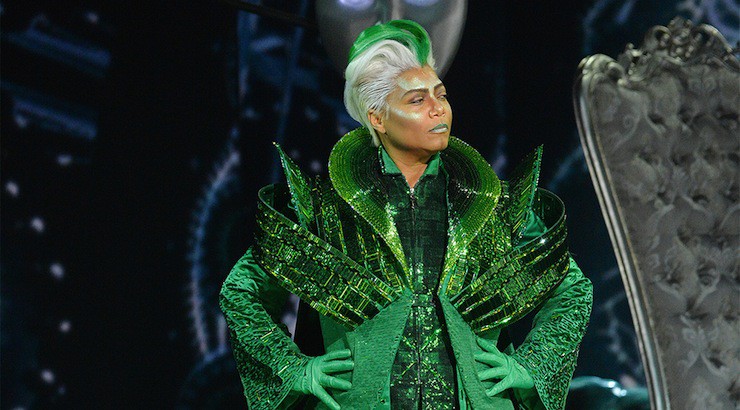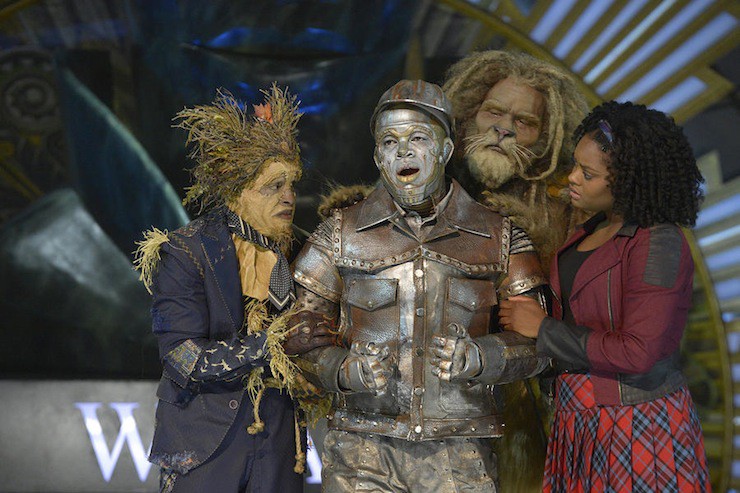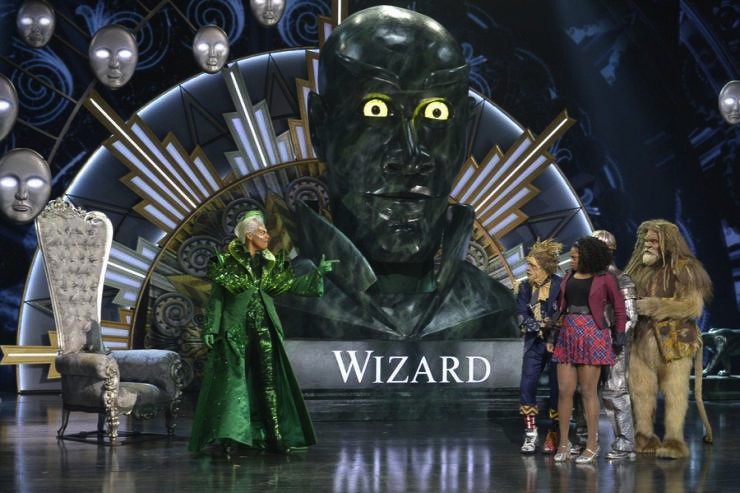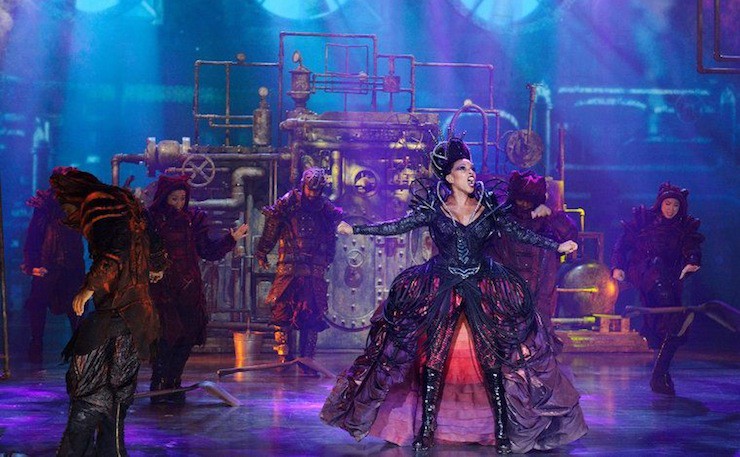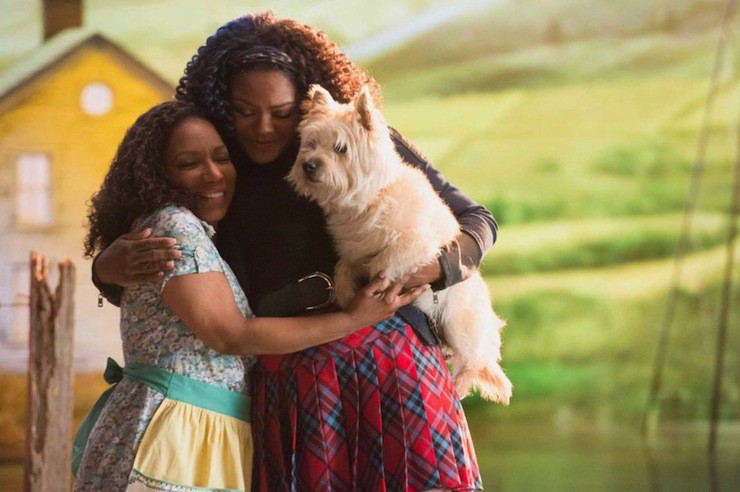I tuned into NBC’s recent live broadcast of The Wiz with trepidation. I mean, yes, I love Oz. Yes, I love musicals. But this particular version of The Wiz was part of NBC’s now annual tradition of airing a live musical in the holiday season. To put it very kindly, the past two live musicals had been, well, not good—NBC’s Peter Pan wasn’t quite the worst version that I’ve seen, but it’s up there, and their version of The Sound of Music did nothing other than make me severely nostalgic for Julie Andrews.
So I had fears. Severe fears.
But it was The Wiz. Which meant Oz. Which meant I had to watch.
And you know what? Barring some early stumbles and some highly questionable camera movements and commercial cuts by NBC—It was pretty good.
The Wiz pretty much follows the well known story—Dorothy lives on a farm, gets swept up in a tornado, and lands in the magical land of Oz (accidentally killing the Wicked Witch of the East on her arrival). To get home, she must travel to the Emerald City, accompanied by a scarecrow without brains, a tin man without a heart, and a lion without courage. Oh, and kill another witch, and unmask a wizard.
Interestingly, The Wiz, despite being a more recent creation, often stays closer to the original Baum book than does the 1939 film. The Wiz, for instance, distinguishes between the Good Witch of the North and the Good Witch of the South; the Tin Man’s story is taken fairly directly from both The Wonderful Wizard of Oz and the later The Tin Woodman of Oz; and Oz is a very real place—a place that can only be reached by magic and storms, certainly, but real for all of that. This particular production added additional touches that fans of the Oz books livetweeting the show with me pointed out with glee: the way all of the Winkie dancers wore bright yellow costumes, for instance.
And in another nod to both the original Oz books and the 1939 film, this particular production also had quite a lot of fun with sly and not so sly references to queer culture—embodied mostly by the magnificent Queen Latifah playing THE Wizard of Oz, in what would have been the performance of the night had Mary J. Blige, as Evilene, the Wicked Witch of the West, not stolen the show just a few minutes later in a legit jaw-dropping gown that I thought was going to kill the entire cast.
But back to Queen Latifah, who sauntered through her first song in an eye popping green costume, portraying the very male Wizard of Oz—only to be later told to come out of the closet already. Understandably, the Wiz wanted to stay in her comfy bathrobe; but, conquered by the sheer adorableness of this Dorothy (newcomer Shanice Williams, who needs to perform everything after this), come out of the closet she did. It was a lovely continuation of the Oz books and the film, both of which have been read as queer, what with the boy Tip transforming into the girl Ozma, the Scarecrow’s 1939 announcement that “some people go both ways,” and, let’s not forget Ruth Plumly Thompson’s sidetrip to Dicksy Land, inhabited only by queer men.
As I said on Twitter the second her first song ended, QUEEN LATIFAH AS THE WIZARD OF OZ FOREVER.
Which is not to say that the show tried to stay too close to the original Oz books—or, for that matter, the original The Wiz. Harvey Fierstein was brought in to update the script, which he did by adding a few emotional touches—filling out Dorothy’s backstory with a sad, angry story of a girl who recently lost both parents and her home, and resents the new one offered by aunt Em (played, in a nice touch, by Stephanie Mills, who performed Dorothy back in the 1970s), giving the Cowardly Lion a moment of heroism with some very sexy flowers (you have to watch it to understand), and adding a contemporary touch with a gleeful iPad moment. A few songs were updated or removed.
It wasn’t perfect. The staging got off to a shaky start—the terrible, slightly LED computerized stage backgrounds for Kansas looked like terribly, slightly LED computerized stage backgrounds for Kansas. The lighting used for the Yellow Brick Road, on the other hand, worked much better. NBC’s camera work was at best intrusive, at worst actively annoying—moving in for closeups during interesting staging moments, cutting off some fabulous dance moves; not letting us see the entire stage during other dance moves, and then—just to pile on the irritation—moving away from some singers during the emotional highlights of their songs. Auugh. NBC also threw in long, frequent commercial interruptions that, I suppose, did give stagehands enough time for elaborate set changes, and ensured that the entire musical would fill out a 2 hour and forty five minute period, but which also cut off emotionally charged moments and disrupted the flow of the musical. And the death of the Wicked Witch of the West, coming as it did after Mary J. Blige’s triumphant performance, was more than a bit of a letdown.
But these quibbles aside, as it continued, The Wiz got, well, more magical, for lack of a better term, what with the entrance of various Cirque de Soleil performers doing aerial and ground stunts; dramatic stage settings for both the Emerald City and the fortress of the Wicked Witch of the West; and increasingly fantastic and outrageous costumes, arguably topped by Glinda’s golden dress that was apparently woven with fiber optic thread. (Dorothy, in her single bravest moment of the entire show, actually hugged the dress and astonishingly enough wasn’t electrocuted and didn’t lose an eye.) In one or two cases this all might have been overdone—the yellow Winkies, for instance, were so yellow that the Tin Man turned yellow from their reflections and my eyes started to hurt. To counter that, the costume for the Tin Man was probably the best I’ve seen in any production, with Ne-Yo rapidly becoming one of my favorite Tin Men ever, particularly shining in his performance of “Slide Some Oil Into Me.” And Evilene and Dorothy’s confrontation about evilness and morality was another glorious moment. (It’s about time that more people call out Dorothy for her murderous ways.)
But above all, the musical was infused with something that has so sadly been lacking in so many interpretations of Oz: joy.
Oh, sure, the 1939 film has its joyful moments, but it ends on a grey, somewhat ambiguous note. The 1985 Return to Oz was the next closest thing to horror, and the 2013 Oz the Great and Powerful often felt labored, when not outright grim.
Here, even the final tears from the Scarecrow, Tin Man, and Cowardly Lion could not take away from the sheer triumph and joy exuded by the final production, particularly in “A Brand New Day.” The last second return of the adorable dog, who vanished after the first couple of minutes of the film (greatly upsetting viewers on Twitter, who wanted to know where Toto was) certainly helped. But I think more was going on here: The Wiz exuded joy because it featured people seizing control of their lives and making their own happiness—and successful. It was a powerful show of not just music and dance, but self-actualization.
And in this, too, it was closer to the original Baum books, in their sheer love of adventure, their assumption that children (and girls) can do anything, and above all joy, than anything I have seen staged or filmed about Oz in years. It felt, for the lack of a better term, Ozzy.
If you need some happiness this holiday season, skip the annual broadcast of It’s a Wonderful Life and stream The Wiz Live from its website instead, or watch the encore performance, scheduled by NBC for this Saturday evening between 8 to 11, EST.
Mari Ness lives in central Florida.










